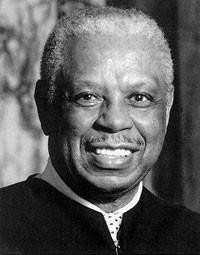Longest-serving black federal judge, known for civil rights and wiretapping rulings, dies at 96

U.S. Circuit Judge Damon Keith. Photo from Wikimedia Commons.
Updated: U.S. Circuit Judge Damon Keith, known for his decisions on wiretapping and civil rights, has died at age 96.
The Detroit Free Press identifies Keith as “the longest-serving black judge in the nation.” The New York Times and the Detroit News also have obituaries.
Keith was appointed to the federal bench in 1967 by President Lyndon Johnson. President Jimmy Carter elevated Keith to the 6th U.S. Circuit Court of Appeals at Cincinnati in 1977.
The New York Times calls Keith “a fountainhead of regional rulings with national implications. He attacked racial segregation in education, housing and employment; conservative efforts to limit African-American voting; and after the terrorist attacks of Sept. 11, 2001, secret hearings to deport hundreds of immigrants deemed suspicious.”
Among his notable opinions:
• In 1970, Keith ordered busing to desegregate public schools in Pontiac, Michigan. The U.S Supreme Court refused to hear the case.
• In 1971, Keith ruled that President Richard Nixon and his Department of Justice violated the Fourth Amendment by wiretapping radicals without court orders. The 6th Circuit affirmed, and the U.S. Supreme Court agreed that there had been a constitutional violation.
• In 2002, Keith wrote a 6th Circuit opinion requiring open hearings in deportation cases for suspected terrorists after Sept. 11. “Democracies die behind closed doors,” Keith wrote.
• Keith dissented in 2016 when the 6th Circuit upheld an Ohio law restricting early and absentee voting. Keith included photos of Martin Luther King Jr. and other black people who were killed in the struggles for civil rights. “The unfettered right to vote is the bedrock of a free and democratic society,” Keith wrote. “Without it, such a society cannot stand.”
Keith has received two American Bar Association awards—the Spirit of Excellence Award in 2001 and the Thurgood Marshall Award in 1997.
The Spirit of Excellence Award recognizes lawyers who have worked to promote a more racially and ethnically diverse legal profession. The Thurgood Marshall Award recognizes contributions to the advancement of civil rights, civil liberties and human rights.
Updated April 29 at 3:10 p.m. to add information on the ABA awards.



